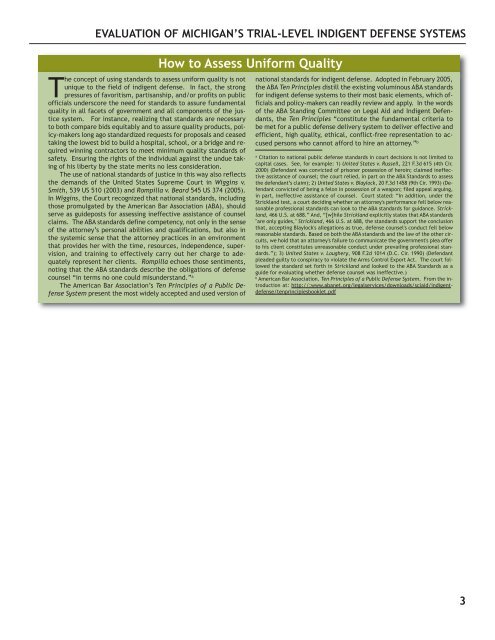Evaluation of Trial-Level Indigent Defense Systems in Michigan
Evaluation of Trial-Level Indigent Defense Systems in Michigan
Evaluation of Trial-Level Indigent Defense Systems in Michigan
Create successful ePaper yourself
Turn your PDF publications into a flip-book with our unique Google optimized e-Paper software.
T<br />
EVALUATION OF MICHIGAN’S TRIAL-LEVEL INDIGENT DEFENSE SYSTEMS<br />
he concept <strong>of</strong> us<strong>in</strong>g standards to assess uniform quality is not<br />
unique to the field <strong>of</strong> <strong>in</strong>digent defense. In fact, the strong<br />
pressures <strong>of</strong> favoritism, partisanship, and/or pr<strong>of</strong>its on public<br />
<strong>of</strong>ficials underscore the need for standards to assure fundamental<br />
quality <strong>in</strong> all facets <strong>of</strong> government and all components <strong>of</strong> the justice<br />
system. For <strong>in</strong>stance, realiz<strong>in</strong>g that standards are necessary<br />
to both compare bids equitably and to assure quality products, policy-makers<br />
long ago standardized requests for proposals and ceased<br />
tak<strong>in</strong>g the lowest bid to build a hospital, school, or a bridge and required<br />
w<strong>in</strong>n<strong>in</strong>g contractors to meet m<strong>in</strong>imum quality standards <strong>of</strong><br />
safety. Ensur<strong>in</strong>g the rights <strong>of</strong> the <strong>in</strong>dividual aga<strong>in</strong>st the undue tak<strong>in</strong>g<br />
<strong>of</strong> his liberty by the state merits no less consideration.<br />
The use <strong>of</strong> national standards <strong>of</strong> justice <strong>in</strong> this way also reflects<br />
the demands <strong>of</strong> the United States Supreme Court <strong>in</strong> Wigg<strong>in</strong>s v.<br />
Smith, 539 US 510 (2003) and Rompilla v. Beard 545 US 374 (2005).<br />
In Wigg<strong>in</strong>s, the Court recognized that national standards, <strong>in</strong>clud<strong>in</strong>g<br />
those promulgated by the American Bar Association (ABA), should<br />
serve as guideposts for assess<strong>in</strong>g <strong>in</strong>effective assistance <strong>of</strong> counsel<br />
claims. The ABA standards def<strong>in</strong>e competency, not only <strong>in</strong> the sense<br />
<strong>of</strong> the attorney’s personal abilities and qualifications, but also <strong>in</strong><br />
the systemic sense that the attorney practices <strong>in</strong> an environment<br />
that provides her with the time, resources, <strong>in</strong>dependence, supervision,<br />
and tra<strong>in</strong><strong>in</strong>g to effectively carry out her charge to adequately<br />
represent her clients. Rompilla echoes those sentiments,<br />
not<strong>in</strong>g that the ABA standards describe the obligations <strong>of</strong> defense<br />
counsel “<strong>in</strong> terms no one could misunderstand.” a<br />
The American Bar Association’s Ten Pr<strong>in</strong>ciples <strong>of</strong> a Public <strong>Defense</strong><br />
System present the most widely accepted and used version <strong>of</strong><br />
How to Assess Uniform Quality<br />
national standards for <strong>in</strong>digent defense. Adopted <strong>in</strong> February 2005,<br />
the ABA Ten Pr<strong>in</strong>ciples distill the exist<strong>in</strong>g volum<strong>in</strong>ous ABA standards<br />
for <strong>in</strong>digent defense systems to their most basic elements, which <strong>of</strong>ficials<br />
and policy-makers can readily review and apply. In the words<br />
<strong>of</strong> the ABA Stand<strong>in</strong>g Committee on Legal Aid and <strong>Indigent</strong> Defendants,<br />
the Ten Pr<strong>in</strong>ciples “constitute the fundamental criteria to<br />
be met for a public defense delivery system to deliver effective and<br />
efficient, high quality, ethical, conflict-free representation to accused<br />
persons who cannot afford to hire an attorney.” b<br />
a<br />
Citation to national public defense standards <strong>in</strong> court decisions is not limited to<br />
capital cases. See, for example: 1) United States v. Russell, 221 F.3d 615 (4th Cir.<br />
2000) (Defendant was convicted <strong>of</strong> prisoner possession <strong>of</strong> hero<strong>in</strong>; claimed <strong>in</strong>effective<br />
assistance <strong>of</strong> counsel; the court relied, <strong>in</strong> part on the ABA Standards to assess<br />
the defendant’s claim); 2) United States v. Blaylock, 20 F.3d 1458 (9th Cir. 1993) (Defendant<br />
convicted <strong>of</strong> be<strong>in</strong>g a felon <strong>in</strong> possession <strong>of</strong> a weapon; filed appeal argu<strong>in</strong>g,<br />
<strong>in</strong> part, <strong>in</strong>effective assistance <strong>of</strong> counsel. Court stated: “In addition, under the<br />
Strickland test, a court decid<strong>in</strong>g whether an attorney's performance fell below reasonable<br />
pr<strong>of</strong>essional standards can look to the ABA standards for guidance. Strickland,<br />
466 U.S. at 688.” And, “[w]hile Strickland explicitly states that ABA standards<br />
"are only guides," Strickland, 466 U.S. at 688, the standards support the conclusion<br />
that, accept<strong>in</strong>g Blaylock's allegations as true, defense counsel's conduct fell below<br />
reasonable standards. Based on both the ABA standards and the law <strong>of</strong> the other circuits,<br />
we hold that an attorney's failure to communicate the government's plea <strong>of</strong>fer<br />
to his client constitutes unreasonable conduct under prevail<strong>in</strong>g pr<strong>of</strong>essional standards.”);<br />
3) United States v. Loughery, 908 F.2d 1014 (D.C. Cir. 1990) (Defendant<br />
pleaded guilty to conspiracy to violate the Arms Control Export Act. The court followed<br />
the standard set forth <strong>in</strong> Strickland and looked to the ABA Standards as a<br />
guide for evaluat<strong>in</strong>g whether defense counsel was <strong>in</strong>effective.)<br />
b<br />
American Bar Association. Ten Pr<strong>in</strong>ciples <strong>of</strong> a Public <strong>Defense</strong> System. From the <strong>in</strong>troduction<br />
at: http://:www.abanet.org/legalservices/downloads/sclaid/<strong>in</strong>digentdefense/tenpr<strong>in</strong>ciplesbooklet.pdf<br />
3



